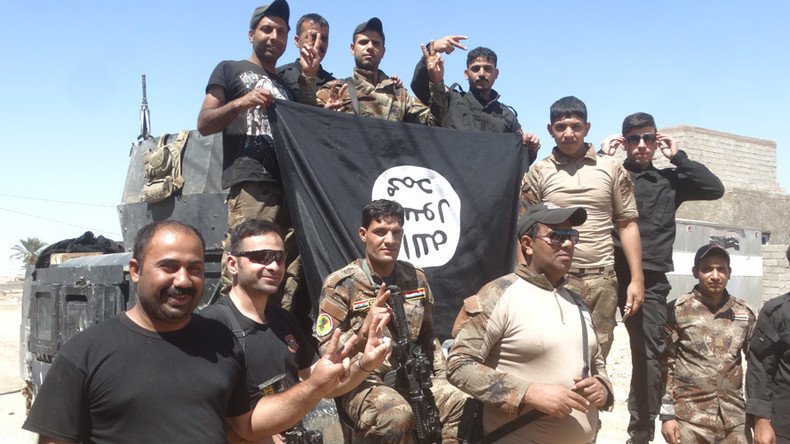United States of terrorism? One-third of Iraqis believe the US supports ISIS

The US has spent more than 13 years in Iraq under the guise of fighting terrorism. However, a recent survey shows that nearly one-third of Iraqis believe the US supports terrorism or Islamic State (IS, formerly ISIS/ISIL).
The Office of Inspector General found that nearly “40 percent of Iraqis believe that the United States is working to destabilize Iraq and control its natural resources,” with 30 percent believing the US supports terrorism or Islamic State.
This belief may partly be perpetuated by reports of videos purporting to show US forces delivering some form of support to IS fighters.
In 2015, Iraq’s Parliamentary Commission on Security and Defense claimed to have revealed documents and photographs showing aircrafts belonging to the international coalition delivering weapons and supplies to IS, the Iraqi News reported.
“We have been receiving this information continuously from many sources, documented in photos and reports to prove that the planes did land at some airports in Mosul, Tal Afar, Al Kiara,” Committee Chairman MP Hakim Zamili said in a press conference.
The authenticity of the photos cannot be verified at this time.
The report also says that most Iraqis are “keenly aware of ISIL’s true nature” and “nearly all Iraqis have unfavorable views of ISIL and oppose its goals and tactics, with no significant variation across religious sects and ethnic groups.”
The fact that a sizable percentage of Iraqis believe the US is helping the wildly unpopular IS could partially explain why the report also found that “the US image among Iraqis has fallen from 38 percent favorable in December 2014 to 18 percent in August 2015.”
For Sunnis, however, the situation is even worse. The report states that for Sunni Arabs, their favorable view of the US dropped from 54 percent all the way to 10 percent.
The loss of Sunni support could be in part due to the US’s backing of Shiite forces. Last month, US Consul General Steve Walker visited wounded members of the Popular Mobilization Units at a hospital in Basra.
The Popular Mobilization Forces – interchangeable with the Popular Mobilization Units – is a conglomeration of primarily Shiite militias that are backed by Iran.
Walker attempted to show his compassion for the wounded Shiite soldiers, saying “The US and Iraqi people are very, very proud of you,” the Al-Monitor reported.
Terror threat to #US from #ISIS returnees is ‘low and manageable’ – study https://t.co/cfFgEwBIUxpic.twitter.com/8cLMXWEdod
— RT America (@RT_America) March 26, 2016
However, Human Rights Watch filed a report on January 31, saying it was possible that the Shia militias were responsible for war crimes.
A Sunni resident of Muqdadiyah told Human Rights Watch, “I know the militiaman [name withheld] and others who roam our streets. They are from the area. ISIS may have been behind the café bombing, but the attacks on Sunni houses, mosques, and people in our area was the [A PMU militia].”
Another Sunni resident told Human Rights Watch that following a café bombing in Muqdadiyah, he came home to discover the words “Blood Wanted” on his family’s home.
In short, a Sunni may not support the US because the US supports a Shiite who does not support the US because the US has relations with Saudi Arabia who practice Wahhabi Islam – which was always anti-Shiite, according to the Washington Post.
Like everything else about US-Middle Eastern relations – it’s complicated. However, as things get more convoluted, it seems like the US is losing the war of hearts and minds.












